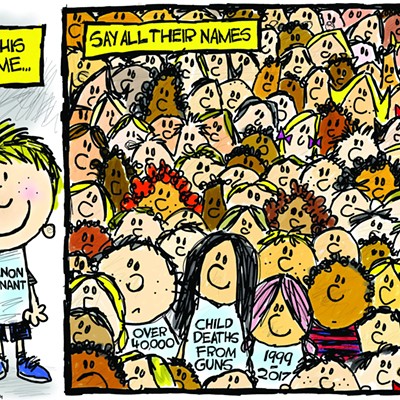One cannot help but think, "What sort of pathology could lead a man to commit such a crime?" After all, there was no known relationship between the perpetrator and Mr. Cottle, and Mr. Cottle was behaving in a perfectly normal and predictable manner. Apparently, murder was the object of the exercise. How do people bring themselves to do that?
Not all in the Old Pueblo are asking these sorts of questions. Some local commentators are, predictably, blaming the crime on the pistol. The pistol was not blamed directly, of course, but there was the implication that had the perpetrator not been in possession of the pistol, the crime might not have happened ... well, yeah, and if the man did not have his car by the schoolyard, the child may not have been abducted.
It must take some real mental acrobatics to ponder what the outcome might have been if the perpetrator had no pistol, while ignoring what might have been had Mr. Cottle possessed one. How hard it must be to accept the fact that the perpetrator brought the gun on purpose--it did not leap into his pocket as he passed by the coffee table. He knew what he was doing. He is a murderer. Some 70 percent of the murders in Tucson may be committed with guns, but 100 percent of the murders in Tucson are committed by murderers.
There is also the truly bizarre implication that pistols have some dark corrupting metaphysical power that turns choirboys into cold-blooded killers. (If this is true, they must be taken from police immediately.) This notion is fostered by certain government agencies that track "crime guns"--guns that have been used in crimes and are thus forever tainted and must be destroyed. One wonders why the government sells motor vehicles that have been confiscated from drug smugglers. Why are they not labeled "crime cars" and squashed into those metal cubes during ceremonies when police chiefs give speeches about how they are doing their part to keep the "crime cars" off the streets?
There is the assumption, sometimes stated outright, that "getting guns off the street" reduces violent crime. This big lie has been repeated so frequently that it has taken on the air of truth. In-depth studies, however, such as professor John R. Lott's book, More Guns, Less Crime: Understanding Crime and Gun-Control Laws, prove the opposite. It is not a coincidence that the murder capital of the country, Washington, D.C., is the same city that has banned pistols.
At least these commentators are not suggesting that the government censor violent video games or movies that may desensitize people to horrific crimes. That is not consistent with a free people, or the First Amendment to the United States Constitution. We can assume that the commentators understand that. What seems odd is the collapse of that understanding when they move from the First Amendment to the Second Amendment.
In the early '70s, here in Tucson, a group of high school thugs thought it would be good sport to beat up a gay man. The most well-known gay bar at the time was the Stonewall on First Avenue (named after the famous Greenwich Village club). The thugs hid along the perimeter of the property and waited. A couple of men left the bar and walked into the parking lot. One of them returned to the bar while the other waited by his car. The thugs seized the opportunity and jumped the lone man. They beat him up pretty well, and he collapsed to the ground. Having had their fun, they left him alone--all but one. One thug, the murderer, continued kicking the unconscious man. The murderer delivered a violent kick to the head--the deathblow. So, where was the gun that transformed the assault into a murder? There was no gun present, but there was a murderer. You do not need a gun to commit a murder, but you do need a murderer.
If our commentators were to suggest that potentially deadly jack boots be reserved for government agents only, I would not argue the point. It's already too disturbing.











